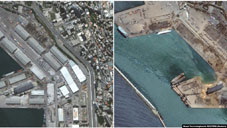
Tbilisi says connection with cargo taken from Georgia to Beirut tragedy unfounded
By Natalia Kochiashvili
Friday, August 7
The Minister of Economy and Sustainable Development of Georgia, Natia Turnava, stated the connection between the tragedy in Beirut and the ship loaded in Georgia 7 years ago is groundless.
At the briefing held after the government session, Turnava said that ammonium nitrate is a nitrogen fertilizer that is produced all over the world, adding that it has been produced in Georgia for years and is one of the important export products.
According to the Minister of Economy, if the technology of storage and consumption of this product used in agriculture is not protected, it may have a disastrous result.
According to Turnava, in 2013, in one of the ports of Georgia, the ship was loaded with ammonium nitrate in compliance with safety norms, and the exporting country can not be held responsible for who bought it and stored it for the next 7 years.
The Minister of Economy expressed her sorrow over the tragedy in Beirut. Two powerful blasts in the Lebanese capital, Baghdad, on August 4th killed at least 137 people and injured 5,000, Lebanese Healthcare Ministry informed on August 6th.In addition to the port infrastructure, buildings within a distance of 10 km have been demolished or damaged.
The Lebanese authorities named the violation of the rules of storing high-explosive ammonium nitrate in one of the port warehouses as the cause of the tragedy. The ship Rhosus was loaded with this product (2750 tones) in the port of Batumi in 2013, which was supposed to carry cargo to Mozambique but stopped in the port of Beirut in September due to technical problems. The ship was seized in 2014, and the Lebanese customs service confiscated the cargo and transferred it to the warehouse. One of the versions argued that the ammonium nitrate that exploded in Beirut could have been produced by 'Rustavi Nitrogen.'
The Moldavian-flagged ship Rhosus belonged to Igor Grechushkin, a resident of the Russian city of Khabarovsk and currently living in Cyprus, who had left the Russian and Ukrainian sailors, members of the ship's crew stranded in Beirut alone.
Rustavi Nitrogen releases a statement regarding the explosion in Beirut, saying that "due to the fact that JSC Rustavi Nitrogen has been operating the plant for the last 3 years, we are deprived of information whether ammonium nitrate was really produced in Rustavi in 2013.”
JSC Rustavi Nitrogen, which is one of the largest exporters in the country, produces up to 1% of the ammonium nitrate consumed in the world, which is produced with local permission and international standards. And goes for export.
“According to reports, this nitrate has been stored in Beirut since 2013, which is a gross violation of its safe storage norms, especially since ammonium nitrate loses the properties necessary for its proper use after 6 months,” reads the statement.
The Maritime Transport Agency also issued a statement regarding the explosion in Beirut, where the agency states that there is no basis for any connection between Georgia and the explosion.


